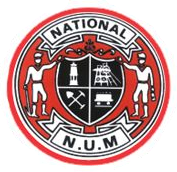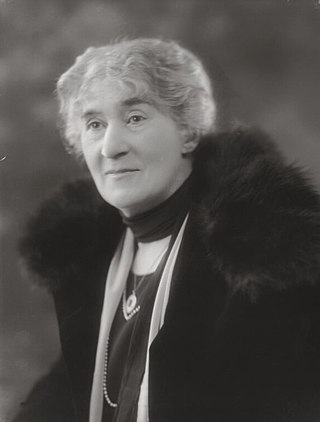Related Research Articles

The Scottish Trades Union Congress (STUC) is the national trade union centre in Scotland. With 40 affiliated unions as of 2020, the STUC represents over 540,000 trade unionists.

Margaret Grace Bondfield was a British Labour Party politician, trade unionist and women's rights activist. She became the first female cabinet minister, and the first woman to be a privy counsellor in the UK, when she was appointed Minister of Labour in the Labour government of 1929–31. She had earlier become the first woman to chair the General Council of the Trades Union Congress (TUC).

The National Union of Mineworkers (NUM) is a trade union for coal miners in Great Britain, formed in 1945 from the Miners' Federation of Great Britain (MFGB). The NUM took part in three national miners' strikes, in 1972, 1974 and 1984–85. Following the 1984–85 strike, and the subsequent closure of most of Britain's coal mines, it became a much smaller union. It had around 170,000 members when Arthur Scargill became leader in 1981, a figure which had fallen in 2023 to an active membership of 82.
A labour council, trades council or industrial council is an association of labour unions or union branches in a given area. Most commonly, they represent unions in a given geographical area, whether at the district, city, region, or provincial or state level. They may also be based on a particular industry rather than geographical area, as for example, in the Maritime Council of Australia which co-ordinated the waterfront and maritime unions involved in the 1890 Australian Maritime Dispute.

The Modern Records Centre (MRC) is the specialist archive service of the University of Warwick in Coventry, England, located adjacent to the Central Campus Library. It was established in October 1973 and holds the world's largest archive collection on British industrial relations, as well as archives relating to many other aspects of British social, political and economic history.

The National Union of Women Teachers (NUWT) was a trade union representing women schoolteachers in Great Britain. It originated in 1904 as a campaign for equal pay for equal work, and dissolved in 1961, when this was achieved.

Gertrude Mary Tuckwell (1861–1951) was an English trade unionist, social worker, author, and magistrate.
The National Union of General Workers (NUGW) was an early general union in the United Kingdom, the most important general union of its era.

The Irish Trades Union Congress (ITUC) was a union federation covering the island of Ireland.

Frederick John Shirley Tanner was a British trade unionist.
The Women's Trade Union League, founded in 1874 and known until 1890 as the Women's Protective and Provident League, was a British organisation promoting trade union for women workers. It was established by Emma Paterson, who had seen unions managed by working women in America.
Clementina Maria Black was an English writer, feminist and pioneering trade unionist, closely connected with Marxist and Fabian socialists. She worked for women's rights at work and for women's suffrage.

The Trades Union Congress (TUC) is a national trade union centre, a federation of trade unions that collectively represent most unionised workers in England and Wales. There are 48 affiliated unions with a total of about 5.5 million members. Paul Nowak is the TUC's current General Secretary, serving from January 2023.

Margaret Edith (May) Tennant, CH, née Abraham, born in Rathgar, County Dublin, Ireland, was a civil servant, trade unionist, factory inspector, and campaigner, who worked to improve conditions for industrial workers and was also involved in women's health and education. She was one of the first people to be appointed to the Order of the Companions of Honour in 1917.
Margaret Hardinge Irwin (1858–1940) was a Scottish suffragist and labour activist who held important posts in the trade union movement.
The South African Trades Union Congress (TUC) was a national trade union federation in South Africa.
The history of trade unions in the United Kingdom covers British trade union organisation, activity, ideas, politics, and impact, from the early 19th century to the present.

Amelia Jane Hicks, nee Cox, known as Amie Hicks, was a British suffragist, trade unionist and socialist activist.
Clara Grace James was a British trade unionist.

The National Federation of Women Workers (NFWW) was a trade union in the United Kingdom of Great Britain and Ireland active in the first part of the 20th century. Instrumental in winning women workers the right to a minimum wage for the first time, the NFWW broke down barriers for women's membership in trade unions in general.
References
- 1 2 3 4 5 Hannam, June. "Women's Industrial Council (act. 1894–c.1917)" . Oxford Dictionary of National Biography (online ed.). Oxford University Press.(Subscription or UK public library membership required.)
- ↑ Simkin, John. "Women's Industrial Council". Spartacus Educational. Retrieved 7 September 2016.
- ↑ Mills, Ernestine (1909). "Pendant". collections.museumoflondon.org.uk. 95.167/1. Retrieved 23 September 2019.
- ↑ "Record: WIC – Women's Industrial Council". LSE Library Services. British Library of Political and Economic Science. Retrieved 7 September 2016.
- ↑ "Women's Industrial Council Printed Collection". Archives Hub. Retrieved 7 September 2016.